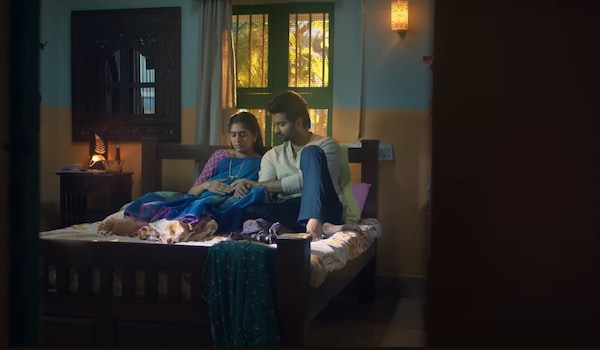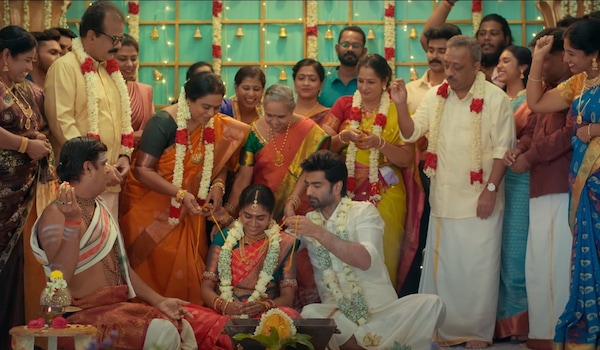DNA movie review: Nimisha Sajayan and Atharvaa drive a twisted helix of emotion, grittiness and crime in Nelson Venkatesan’s thriller
DNA movie review: Nimisha Sajayan and Atharvaa star in an intense film with interesting pockets driven by drama and grittiness, despite some unevenness

Last Updated: 11.38 AM, Jul 22, 2025
DNA movie plot:
Anand (Atharvaa) and Divya (Nimisha Sajayan) who come with their fair share of baggage, get into an arranged marriage and lead a happy and normal life together. All seem to be going well and beyond just well when the couple is expecting their first child. But when Divya claims that the infant handed over to her is not their child in fact, it sets Anand chasing a network that is beyond his imagination to comprehend.
DNA movie review:

Early on in DNA, Anand’s father (Chetan) curses him vilely after his son comes home drunk and sabotages a family event that was to conclude amicably if not for the ruckus by Anand. As the son lays on ground unconscious and intoxicated, the father shouts and curses Anand to have an ill-fated life. Moments later in the film, as the new father Anand frantically searches for his son, the father reminisces his curse and guilt trips him. The moment might be a little to less value addition to the entirety of the story, but still holds strong about how mere seconds of realisation and revelation can add up to the major turning points in life. DNA too pretty much works on this space where moments determine the reality, and how far along can one go to believe their instincts or not.
In his previous films Farhana and Monster, director Nelson Venkatesan had created a self-contained ecosystem of world-building. The characters and circumstances were carefully placed inside a bubble and worked around the thematic happening of things. But with DNA, Nelson’s world becomes broader and in turn, more in tune with the mainstream aesthetics. One cannot help but notice that this also comes with a couple of bar songs that seem to be a force fit into the screenplay. But beyond, DNA pretty much returns to the Nelson’s zone where intensity is built notches up with a gritty spin to a romantic thriller, and a cleverly packed chain of events lead up to a well-written drama.
Nelson crafts two characters who come from different walks of life. Anand, who sustained a heartbreak and pretty much adapted an alcoholic loafer’s lifestyle, is made to move on to marry a young woman Divya who suffers from borderline personality disorder. And nevertheless, to say, to the eyes of society, they seem to be the weak individuals who are deemed perfectly fit for each other, as their marriage of convenience takes place. Nimisha brings in much-needed finesse to her role as a woman diagnosed with a mental condition that is not comprehendible beyond being called “paithiyam” by the stands of the conventional society. The film dabbles with this concept, and entwines it with the post-partum depression and psychosis for a while, before it delves back into its thriller zone. For how much ever I wish that the psychological angle that is invested on the couple’s baggage to be explored instead of little lags that come in DNA, the film gets some smart sense when it pulls audience back to the larger scheme of things and the crime network that operates.

Much like in Farhana where characters cannot be blindly labelled good or bad, and falls in the smart shades of grey, DNA too takes the same route. A particular old woman in the film, who might be up to questionable activities, justifies her wrongdoings. But the words are coined in a way that you almost want to give her an upper hand, despite knowing the wrath she comes up with. She reflects being a small pawn in a bigger network, and the way it unravels convinces DNA to be a good thriller. And with the main characters, DNA touches with some realism when a new father is unable to recognise if the infant he is holding is his, while all that is needed for the mother, is to just share breath of air with her baby, to recognise it.
Having said that, the film does have some shortcomings, in terms of how it gives itself to certain commerciality and relying on convenient choices. It also feels a little rushed when the scheme of things gets unravelled, but with a crisp runtime that DNA comes with, it makes up with an emotionally-charged climax, where Nimisha gets an upper-hand once again. The film also comes for Atharvaa as a boon, while enabling him to showcase his versatility as both performer and commercial hero. This also gives an idea of how the film has so much potential to be spun as a mini-series, given its perfect pockets in story that can be explored in-depth with the episodic nature.
DNA movie verdict:
A smartly written thriller with an equally balancing emotional quotient, DNA becomes an engaging film driven by powerhouse of performances. Despite its shortcomings with unevenness, potential to explore the psyche of protagonists, and pacing issues, the film picks up itself when needed and becomes a solid and rewarding watch.
Subscribe to our newsletter for top content, delivered fast.





